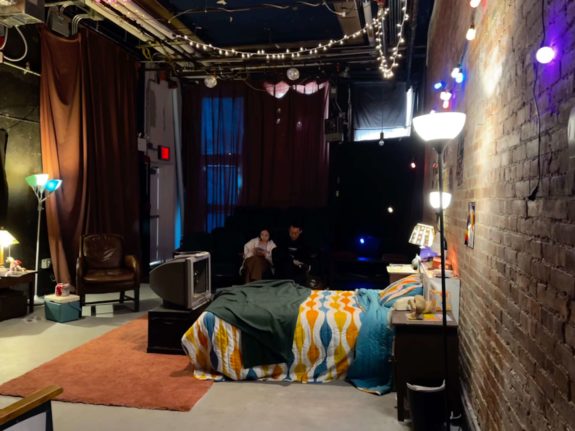On Saturday, April 21, Staff Writers Maya Reisner and Isa RingswaldEgan attended Pale Fire Theater’s production of This Is Our Youth staged at the American Theater of Actors.
Editor’s note: This review and play contains mentions of sizeism, substance use, violence, overdose and death, as well as misogynistic, homophobic, antisemitic, and racist language.
Pale Fire Theater is an independent collective of students from Columbia and NYU who aim to put on high-quality productions for young people. The group was started in 2019 by Shayan Hooshmand (CC ‘23) and Henry Alper (NYU Tisch) and made their New York debut this year with Waiting for Godot. Their previous performances have been outstanding, and we were eager to see this new production.
As we walked into Beckman Theatre at 314 W 54th St., we were greeted with corecore-esque audio pouring out of the speakers—snippets from news announcements, advertisements, and other 80s-feeling voices. The set is Dennis’s bedroom, decorated with mismatched fairy lights, Talking Heads posters, and other suitably 80s memorabilia. The colorfully disorganized room felt increasingly more appropriate to Dennis’s character as the play advanced.

This is Our Youth is a two-act play that follows three characters, Dennis Ziegler (Nils Asmundsson, CC ‘24), Warren Straub (Shayan Hooshmand, CC ‘23), and Jessica Goldman (Marie-Josée Bourelly, CC ’23) over 48 hours as they confront the realities of young adulthood. Crash landing in Dennis’s apartment, Warren desperately looks for a place to stay after being kicked out by his abusive father. The two have a strained relationship, and bicker as they attempt to figure out what Warren should do to escape his father’s wrath over the $15,000 he stole on his way out. Other than the large quantity of money, Warren totes along his childhood memorabilia, a suitcase of his antique toys and albums.
The rest of the first act follows Warren’s interactions with Jessica, who he finds himself alone with. They debate about their views on the future, with Warren disagreeing with Jessica’s notion that they will eventually be entirely different than they are now. Reminiscing over the suitcase of toys, Warren divulges more about his family, and the two become close. In a moment of impulsivity, the two run off to spend the night in a hotel.
Hooshmand’s painfully earnest performance flawlessly portrays the unfortunately impulsive actions of a deeply insecure individual who continues to take abuse from a friend he idolizes. Bourelly’s performance as Jessica was similarly achingly sincere. Her awkwardness and defensiveness clashed perfectly against Hooshmand’s Warren and his neuroses. Admundsson, likewise, played off of the others’ performance effectively, creating a group dynamic that was appropriately difficult to watch. Sophie Craig’s (CC ‘23) direction shone in how hard-hitting certain lines like “you have a talent for misery,” or “I assume you feel bad about something you think has happened to you” rested with viewers after the show.
The two friends fight, brutally insulting one another and bringing their families’ dark truths to light. It is revealed that Dennis lives alone as his parents prefer not to have him home, and Warren struggles with his father’s abuse, his mother’s leaving, and his sister’s murder. After waves of fighting and joking around, the two boys decide to indulge in the $15,000, planning to buy drugs and invite Dennis’ girlfriend, Valerie (who never appears), and Jessica over, hoping that Warren’s luck with women will take a turn for the better.
The second act dives deeper into the two young men’s lives, exposing that Dennis’s father is sick as he grapples with his crumbling family. He fights with his girlfriend and then cries to Warren, blaming his mother for his own maladapted behavior. The two boys panic and decide that the only thing to do is for Warren to recoup the money and go home. Dennis leaves to sell the toys, devastating Warren in his time of desperation.
Pale Fire Theater’s performance showed the flawed reality of being young in a completely unromanticized look into an oft romanticized demographic: rich kids living their young adult lives in New York City. It portrayed how awful life can be even for the most privileged. This sense of nihilism and the uniting theme of youth’s chaos through the entirety of the show made the ending even more existential and ambiguous.
The combined effect of great performances from the cast, creative set design, and powerful writing made this experience very enjoyable and thought-provoking. The complicated interpersonal dynamics and difficulties of being young are just as relevant now as they were when This is Our Youth was written.
Set image via Bwog Staff
This is Our Youth via Pale Fire Program


 1 Comments
1 Comments
1 Comment
@Anonymous Don’t trust anyone over fifty.
Teaching, driving and voting should not be allowed after age sevety.